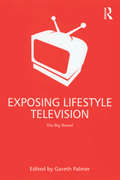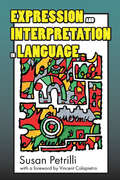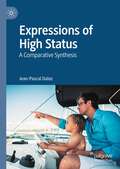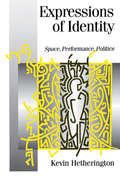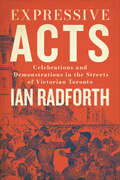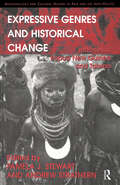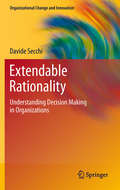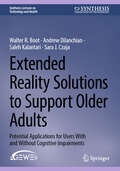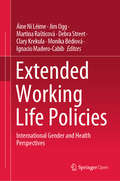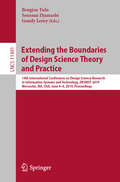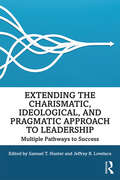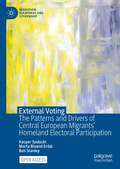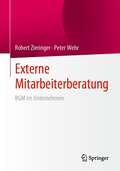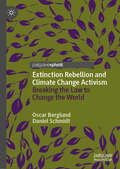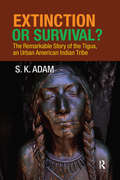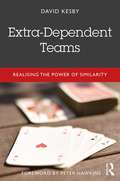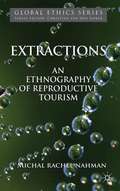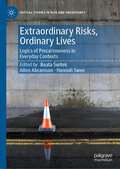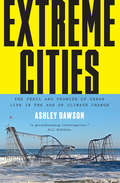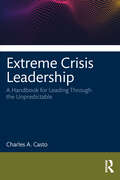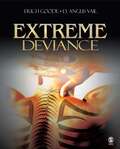- Table View
- List View
Exposing Lifestyle Television: The Big Reveal
by Gareth PalmerIn the last decade lifestyle television has become one of the most dominant television genres, with certain shows now global brands with formats exploited by producers all over the world. What unites these programmes is their belief that the human subject has a flexible, malleable identity that can be changed within television-friendly frameworks. In contrast to the talk shows of the eighties and nineties where modest transformation was discussed as an ideal, advances in technology, combined with changing tastes and demands of viewers, have created an appetite for dramatic transformations. This volume presents case studies from across the lifestyle genre, considering a variety of themes but with a shared understanding of the self as an evolving project, driven by enterprise. Written by an international team of scholars, the collection will appeal to sociologists of culture and consumption, as well as to scholars of media studies and media production throughout the world.
Expression and Interpretation in Language
by Susan PetrilliThis book features the full scope of Susan Petrilli's important work on signs, language, communication, and of meaning, interpretation, and understanding. Although readers are likely familiar with otherness, interpretation, identity, embodiment, ecological crisis, and ethical responsibility for the biosphere-Petrilli forges new paths where other theorists have not tread. This work of remarkable depth takes up intensely debated topics, exhibiting in their treatment of them what Petrilli admires-creativity and imagination. Petrilli presents a careful integration of divergent thinkers and diverse perspectives. While she abandons hope of attaining a final synthesis or an unqualifiedly comprehensive outlook, there remains a drive for coherence and detailed integration. The theory of identity being advocated in this book will provide the reader with an aid to appreciating the identity of the theorizing undertaken by Petrilli in her confrontation with an array of topics. Her theory differentiates itself from other offerings and, at the same time, is envisioned as a process of self-differentiation. Petrilli's contribution is at once historical and theoretical. It is historical in its recovery of major figures of language; it is theoretical in its articulation of a comprehensive framework. She expertly combines analytic precision and moral passion, theoretical imagination and political commitment.
Expressions of High Status: A Comparative Synthesis
by Jean-Pascal DalozThis book is an unprecedented effort to compare representations and practices of social distinction worldwide and over the centuries. It is based on years of observation in many countries and on the consultation of more than 2 500 multi-disciplinary publications dealing directly or indirectly with this theme. In two previous theoretical volumes on the topic (The Sociology of Elite Distinction and Rethinking Social Distinction) welcomed as major breakthroughs, Jean-Pascal Daloz has established himself as the foremost scholar of symbolic social superiority from a comparative perspective. After having rigorously shown the limits of the main analytical frameworks available and outlined a much more inductive approach, his new empirical book continues this intellectual journey. Taking into consideration all sorts of cases and patterns of meaning, it offers an impressive synthesis demonstrating how diverse the expressions of high status can be. This comparative work is intended to be a crucial reference point and an important source of inspiration for researchers and students across many fields.
Expressions of Identity: Space, Performance, Politics (Published in association with Theory, Culture & Society)
by Kevin HetheringtonThis innovative book sets out to question what we understand by the term `new social movements'. By examining a range of issues associated with identity politics and alternative lifestyles, the author challenges those who treat new social movements as instances of wider social change while often ignoring their more `local' and `dispersed' importance. This book questions what it means to adopt an identity that is organised around issues of expressivism - and offers a series of non-reductionist ways of looking at identity politics. Hetherington analyzes expressive identities through issues of performance, spaces of identity and `the occasion'. This important work shows how the significance of identity politics are at once local, plural, situated and topologically complex.
Expressive Acts: Celebrations and Demonstrations in the Streets of Victorian Toronto
by Ian RadforthIn nineteenth-century Toronto, people took to the streets to express their jubilation on special occasions, such as the 1860 visit of the Prince of Wales and the return in 1885 of the local Volunteers who helped to suppress the Riel resistance in the North-West. In a contrasting mood, people also took to the streets in anger to object to government measures, such as the Rebellion Losses bill, to heckle rival candidates in provincial election campaigns, to assert their ethno-religious differences, and to support striking workers. Expressive Acts examines instances of both celebration and protest when Torontonians publicly displayed their allegiances, politics, and values. The book illustrates not just the Victorian city’s vibrant public life but also the intense social tensions and cultural differences within the city. Drawing from journalists’ accounts in newspapers, Expressive Acts illuminates what drove Torontonians to claim public space, where their passions lay, and how they gave expression to them.
Expressive Genres and Historical Change: Indonesia, Papua New Guinea and Taiwan (Anthropology and Cultural History in Asia and the Indo-Pacific)
by Andrew StrathernThis collection of essays, edited by leading scholars in the field, focuses on how expressive genres such as music, dance and poetry are of enduring significance to social organization. Research from New Guinea, Indonesia and Taiwan is used to assess how historical changes modify these forms of expression to adjust to the social and political needs of the moment. The volume is unique in exploring the significance of expressive genres for the social processes of coping with and adjusting to change, either from outside forces or from internal ones. The contributions detail first-hand fieldwork, often conducted over a period of many years, and with each contributor bringing their experience to bear on both the aesthetic and the analytical aspects of their materials. Comparative in scope, the volume covers Austronesian and non-Austronesian speakers in the wider Indo-Pacific region.
Expulsions
by Saskia SassenSoaring income inequality and unemployment, expanding populations of the displaced and imprisoned, accelerating destruction of land and water bodies: today's socioeconomic and environmental dislocations cannot be fully understood in the usual terms of poverty and injustice, according to Saskia Sassen. They are more accurately understood as a type of expulsion--from professional livelihood, from living space, even from the very biosphere that makes life possible. This hard-headed critique updates our understanding of economics for the twenty-first century, exposing a system with devastating consequences even for those who think they are not vulnerable. From finance to mining, the complex types of knowledge and technology we have come to admire are used too often in ways that produce elementary brutalities. These have evolved into predatory formations--assemblages of knowledge, interests, and outcomes that go beyond a firm's or an individual's or a government's project. Sassen draws surprising connections to illuminate the systemic logic of these expulsions. The sophisticated knowledge that created today's financial "instruments" is paralleled by the engineering expertise that enables exploitation of the environment, and by the legal expertise that allows the world's have-nations to acquire vast stretches of territory from the have-nots. Expulsions lays bare the extent to which the sheer complexity of the global economy makes it hard to trace lines of responsibility for the displacements, evictions, and eradications it produces--and equally hard for those who benefit from the system to feel responsible for its depredations.
Extendable Rationality
by Davide Secchi"How do people make decisions in organizations?" is the question at the core of this book. Do people act rationally? Under what conditions can information and knowledge be shared to improve decision making? Davide Secchi applies concepts and theories from cognitive science, organizational behavior, and social psychology to explore the dynamics of decision making. In particular, he integrates "bounded rationality" (people are only partly rational; they have (a) limited computational capabilities and (b) limited access to information) and "distributed cognition" (knowledge is not confined to an individual, but is distributed across the members of a group) to build upon the pioneering work of Herbert Simon (1916-2001) on rational decision making and contribute fresh insights. This book is divided into two parts. The first part (Chapters 2 to 5) explores how recent studies on biases, prospect theory, heuristics, and emotions provide the so-called "map" of bounded rationality. The second part (Chapter 6 to 8) presents the idea of extendable rationality. In this section, Secchi identifies the limitations of bounded rationality and focuses more heavily on socially-based decision processes and the role of "docility" in teaching, managing, and executing decisions in organizations. The practical implications extend broadly to issues relating to change and innovation, as organizations adapt to evolving market conditions, implementing new systems, and effectively managing limited resources. The final chapter outlines an agenda for future research to help understand the decision making characteristics and capabilities of an organization.
Extended Reality Solutions to Support Older Adults: Potential Applications for Users With and Without Cognitive Impairments (Synthesis Lectures on Technology and Health)
by Sara J. Czaja Walter R. Boot Andrew Dilanchian Saleh KalantariThis book explores one way in which recent hardware and software advances have placed humanity on the precipice of a significant shift in how technology can shape our interactions with the world around us: the application of transformative extended reality (XR) technology solutions to support the health, wellness, quality of life, and independence of older adults living with and without cognitive impairments. The book provides an overview of the state-of-the art research on XR-based solutions utilizing virtual reality (VR) and augmented reality (AR), challenges that can addressed with these technologies, evidence to date on the efficacy of these solutions, and the nature of these solutions and challenges to their implementation. It explores practical ways XR can be integrated into health and lifestyle maintenance activities for older populations in a diversity of situations through thematic chapters using realistic personas and scenarios. These thematic chapters are organized around the AGE-WELL Challenge Area topics, including staying connected, healthy lifestyles and wellness, mobility, and cognitive health, as well as an additional emphasis on leisure. Other chapters provide guidance on important issues to consider when designing XR-based solutions for older adults, how to evaluate and test XR solutions, the implementation of the user-centered design process, and the book concludes by highlighting unanswered questions and future research directions. This book approaches XR for older adults with and without cognitive impairments from the authors’ diverse research backgrounds in psychology, engineering, gerontology, and design. It will be of interest to academic and industry professionals as well as care providers considering the potential for XR interventions now and in the future.
Extended Working Life Policies: International Gender and Health Perspectives
by Jim Ogg Debra Street Áine Ní Léime Martina Rašticová Clary Krekula Monika Bédiová Ignacio Madero-CabibThis open access book addresses the current debate on extended working life policy by considering the influence of gender and health on the experiences of older workers. Bringing together an international team of scholars, it tackles issues as gender, health status and job/ occupational characteristics that structure the capacity and outcomes associated with working longer. The volume starts with an overview of the empirical and policy literature; continues with a discussion of the relevant theoretical perspectives; includes a section on available data and indicators; followed by 25 very concise and unique country reports that highlight the main extended working life (EWL) research findings and policy trajectories at the national level. It identifies future directions for research and addresses issues associated with effective policy-making. This volume fills an important gap in the knowledge of the consequences of EWL and it will be an invaluable source for both researchers and policy makers.
Extending the Boundaries of Design Science Theory and Practice: 14th International Conference on Design Science Research in Information Systems and Technology, DESRIST 2019, Worcester, MA, USA, June 4–6, 2019, Proceedings (Lecture Notes in Computer Science #11491)
by Gondy Leroy Bengisu Tulu Soussan DjamasbiThis book constitutes the thoroughly refereed proceedings of the 14th International Conference on Designing for a Digital and Globalized World, DESRIST 2019, held Worcester, MA, USA, June 2019. The 20 revised full papers included in the volume were carefully reviewed and selected from 54 submissions. They are organized in the following topical sections: Design Science Research Theory and Methodology; Design Science Research Applications in Healthcare; Design Science Research Applications in Data Science; and Design Science Research Applications in Emerging Topics.
Extending the Charismatic, Ideological, and Pragmatic Approach to Leadership: Multiple Pathways to Success
by Samuel T. Hunter Jeffrey B. LovelaceThe past 15 years of leadership research have taught us a valuable lesson: There is more than one way to be a successful leader. The Charismatic, Ideological, and Pragmatic (CIP) approach to leadership showcases three unique yet equally viable pathways to leading and influencing others. This book reviews the history of the CIP model of leadership and summarizes the empirical findings supporting the framework. Emerging areas of leadership research on the CIP model are explored, including: followership, shared leadership, measurement, and gender. Contributions from a range of international academics provide readers with insight into the foundation of the CIP theory of leadership and into where the future of leadership perspectives are headed. It includes a chapter for practitioners seeking to understand the framework through an applied lens and offers evidence for a new scale designed to quantify a leader’s CIP profile. Finally, a revised theoretical framework, incorporating key findings to expand the model to meet the diverse needs of future researchers and leaders is offered. This thought-provoking volume will be essential reading for all scholars, researchers and students interested in the charismatic, ideological, and pragmatic approach to leadership, as well as professionals considering the introduction of a new leadership model.
External Voting: The Patterns and Drivers of Central European Migrants' Homeland Electoral Participation (Migration, Diasporas and Citizenship)
by Marta Bivand Erdal Kacper Szulecki Ben StanleyThis open access book is the first monograph that brings together insights from comparative politics, political sociology, and migration studies to introduce the current state of knowledge on external voting and transnational politics. Drawing on new data gathered within the DIASPOlitic project, which created a comparative dataset of external voting results for 6 countries of origin and 17 countries of residence as well as an extensive qualitative dataset of 80 in-depth interviews with four groups of migrants, this book not only illustrates theoretical problems with empirical material, but also provides answers to previously unaddressed questions. The empirical material focuses on the European context. The Eastern Enlargement of the European Union (2004-2007) triggered a westward wave of migration from Central and Eastern European countries which faced the expansion of existing émigré communities and the emergence of new ones. As this process coincided with the expansion of migrant voting rights, the result is a large set of populous diaspora communities which can potentially have a significant impact on country electoral politics, making the study of external voting highly relevant. This book’s introduction takes stock of current research on transnational politics and external voting, presenting core puzzles. The following chapter introduces the context of intra-European migration and the political situation in Central-Eastern European sending countries. The next two sections address the empirical puzzles, drawing on new quantitative and qualitative. The conclusion takes stock of the evidence gathered, discusses the normative problem of non-resident voters enfranchisement, connects external voting to the broader debate on political remittances and finally, maps the terrain ahead for future research. This concise, empirically grounded introduction to external voting is critical reading in structuring the debate around migration and shaping research agendas for the future.
Externe Mitarbeiterberatung: BGM im Unternehmen
by Peter Wehr Robert ZieringerDieses Buch bietet eine fundierte Einführung zur Auswahl, Einführung, Qualitätskontrolle und Nutzen eines Mitarbeiterunterstützungsprogrammes und richtet sich an interessierte Leser aus den Bereichen Human Resources, Arbeitsmedizin, Arbeitssicherheit, Betriebliches Gesundheitsmanagement und Unternehmensleitung. Mitarbeiterunterstützungsprogramme, auf Englisch auch Employee Assistance Program (EAP) genannt, sind eine mittlerweile vielfach angebotene Dienstleistung, die Unternehmen helfen soll die Gesundheit ihrer Mitarbeiter zu erhalten. Mitarbeiter können sich (auf Kosten des Arbeitgebers) beim EAP-Anbieter zu Themen der psychischen Gesundheit, teils auch zu körperlichen Beschwerden, finanziellen, rechtlichen sowie familiären Themen beraten lassen. Sie werden sowohl mit den theoretischen Grundlagen der Mitarbeiterberatung als auch mit den organisatorischen Aspekten vertraut gemacht. Das Buch greift auf Beispiele aus der Unternehmenspraxis zurück, nähert sich aber auch wissenschaftlich dem Thema, indem Studien zur Auswirkungen von Mitarbeiterunterstützungsprogrammen auf Fehlzeiten, Produktivität, Arbeitsunfälle und Mitarbeiterbindung behandelt werden.
Extinction Rebellion and Climate Change Activism: Breaking the Law to Change the World
by Daniel Schmidt Oscar BerglundThis book summarises and critiques Extinction Rebellion (XR) as a social movement organisation, engaging with key issues surrounding its analysis, strategy and tactics. The authors suggest that XR have an underdeveloped and apolitical view of the kind of change necessary to address climate change, and that while this enables the building of broad movements, it is also an obstacle to achieving the systemic change that they are aiming for. The book analyses different forms of protest and the role of civil disobedience in their respective success or failure; democratic demands and practices; and activist engagement with the political economy of climate change. It engages with a range of theoretical perspectives that address law-breaking in protest and participatory forms of democracy including liberal political theory; anarchism and forms of historical materialism, and will be of interest to students and scholars across politics, international relations, sociology, policy studies and geography, as well as those interested in climate change politics and activism.
Extinction or Survival?: The Remarkable Story of the Tigua, an Urban American Urban Tribe
by S. K. AdamHow could an urban American Indian tribe, having survived relentless earlier governmental attempts to declare its culture extinct, be once again on the verge of extinction? The Tigua of Ysleta del Sur Pueblo dwell in the outskirts of El Paso, Texas, where the infamous Jack Abramoff was in the news for helping to close their highly successful casino. This casino had created jobs and funded health care for the tribe, and now the Tigua are once more taking action to preserve their economy, membership, and culture. This highly publicised casino story is set against the remarkably rich history of the Tigua, including earlier attempts by national and state governments to steal the tribe's land and destroy its legal status. Anthropologist S. K. Adam explores how questions of identity can be linked to cultural survival: Had the Tigua somehow survived 300 years of persecution and urban encroachment, or, as alleged by the government, were they really just Mexicanised Indians acting fraudulently? Adam examines how terms such as indigeneity, identity, authenticity, culture change, and perseverance are understood and defined by the US government. He analyses how issues of power, law, discourse, genocide, and self-determination affect the relationship between the United States and its indigenous populations, past and present.
Extinguish Burnout: A Practical Guide to Prevention and Recovery
by Terri Bogue Rob BogueBurnout can leave you feeling stuck, exhausted, and powerless but there is a path out. Extinguish Burnout is a clear, compassionate and research-informed guide to understanding what drives burnout and how to overcome it. Authors Rob and Terri Bogue offer readers practical tools and short, actionable chapters that can be easily digested even in moments of overwhelm. From improving self-talk and building resilience to asking for support and setting realistic expectations, this book transforms abstract well-being concepts into daily habits that restore energy and hope.· What causes burnout and how to escape· How to more realistically value the results you're getting· When to ask for and receive more support· What four simple physical self-care activities reduce burnout· How to change your self-talk for the better· What to do to manage your demands so you're not so exhausted· How to better recognize your personal value· How to integrate your self-image and reduce your stress· How to identify and eliminate barriers to your efficacy· How to build resilience against setbacks· Why hope is essential· Why failure isn't final· How to be detached without being disengaged Ideal for anyone feeling worn down by work or life, it provides the insight and encouragement needed to move from surviving to thriving.
Extra-Dependent Teams: Realising the Power of Similarity
by David KesbyInter-Dependent Teams: people working together to achieve a common goal. Extra-Dependent Teams: people learning together to develop a common practice. Extra-Dependent Teams: Realising the Power of Similarity reframes the conventional mental model of teams into two complementary mental models of Extra-Dependent and Inter-Dependent Teams. Both types of team operate inside organisations today, but convention doesn’t realise their difference. Extra-Dependent Teams are present in organisations because of their similarity – they do similar work in similar ways, but don’t actually work together. People who lead them often feel like they are herding cats. Convention cites them as dysfunctional. But cats don’t herd. They are independent whilst all being the same. Realising this difference provides new ways of understanding and addressing the problems that convention can’t overcome. The reader will be introduced to the distinctness of Extra-Dependent Teams, their dynamics, how they perform, how they develop and how to lead them. Inspired by research on communities of practice and social identity, the book delivers an original and pragmatic approach to teams, being packed with examples, case studies, practical guidance and words of warning for managers and others about how to transform their Extra-Dependent Teams from peripheral problems into engines of innovation and growth.
Extractions
by Michal Rachel NahmanMichal Nahman traces different kinds of 'extraction': the practices of human egg harvesting in different national contexts; the political economic consequences of such extraction for the women involved and the ways in which this has consequences for nationalism and race or 'Israeli extraction'.
Extractive Bargains: Natural Resources and the State-Society Nexus (Frontiers of Globalization)
by Paul Bowles Nathan AndrewsThis book is the first to focus on state-led ‘extractive bargains,’ designed to reach a social consensus on the extent of extractive activities, how they should be governed and their negative consequences mitigated. These state-led ‘bargains’ have taken a number of different forms and offer varying degrees of promise in meeting environmental and social concerns. The book critically examines ‘bargains’ in states across the Global North and the Global South, incorporates Indigenous issues, and judiciously assesses their prospects for promoting long-term sustainability. It focusses on mineral and fossil fuel extraction in particular including bargains designed to govern the former as the demand for minerals used in “green energy” increases and to limit the use of the latter.The book will be of interest to students and researchers of global studies, global political economy, political science, political sociology, sustainability, environmental sociology, development studies and geography. Chapter 1 is available open access under a Creative Commons Attribution 4.0 International License via link.springer.com.
Extraordinary Groups: An Examination of Unconventional Lifestyles (Ninth Edition)
by Richard T. Schaefer William W. ZellnerNow in its ninth edition, Extraordinary Groups has had a most gratifying history. Written by sociologists, using and illustrating sociological principles, the book has also been adopted in various other social science courses, including anthropology, religion, history, and psychology. This interdisciplinary approach is one reason the book has been used in hundreds of colleges and universities, a number that continues to grow.
Extraordinary Risks, Ordinary Lives: Logics of Precariousness in Everyday Contexts (Critical Studies in Risk and Uncertainty)
by Allen Abramson Beata Świtek Hannah SweeThis book untangles the relationship between expert categorisations of risk and the on-the-ground experiences of untrained ‘ordinary’ people who may be routinely subjected to significant danger in a variety of extraordinary contexts. It considers political, ethical and moral dimensions of risk and calls for more targeted ethnographic research, designed to reveal how grass-roots risk dispositions and practice intersect with official discourses, individual agency and community resilience.
Extreme Cities: The Peril and Promise of Urban Life in the Age of Climate Change
by Ashley DawsonA cutting exploration of how cities drive climate change while being on the frontlines of the coming climate crisisHow will climate change affect our lives? Where will its impacts be most deeply felt? Are we doing enough to protect ourselves from the coming chaos? In Extreme Cities, Ashley Dawson argues that cities are ground zero for climate change, contributing the lion’s share of carbon to the atmosphere, while also lying on the frontlines of rising sea levels. Today, the majority of the world’s megacities are located in coastal zones, yet few of them are adequately prepared for the floods that will increasingly menace their shores. Instead, most continue to develop luxury waterfront condos for the elite and industrial facilities for corporations. These not only intensify carbon emissions, but also place coastal residents at greater risk when water levels rise.In Extreme Cities, Dawson offers an alarming portrait of the future of our cities, describing the efforts of Staten Island, New York, and Shishmareff, Alaska residents to relocate; Holland’s models for defending against the seas; and the development of New York City before and after Hurricane Sandy. Our best hope lies not with fortified sea walls, he argues. Rather, it lies with urban movements already fighting to remake our cities in a more just and equitable way.As much a harrowing study as a call to arms Extreme Cities is a necessary read for anyone concerned with the threat of global warming, and of the cities of the world.
Extreme Crisis Leadership: A Handbook for Leading Through the Unpredictable
by Charles CastoThis concise handbook presents a framework to help leaders across sectors understand what their role should be in an extreme crisis and supplements this understanding with practical advice. Leadership is often presented as a kind of mastery—but no single person can master an extreme crisis event such as the COVID-19 pandemic. Leaders need a workable resource based on research and experience that can be accessed quickly and referenced easily to effectively handle crises and mitigate repercussions: This handbook is that resource. It begins with diagnostic tools to identify crisis types and leadership roles, then presents an easy-to-use matrix framework that allows readers to focus on the specific example-based section that best fits their role and the kind of crisis they face. This handbook is accessible to leaders at all levels, from shift supervisors and emergency responders to CEOs and government executives. It will be an essential ready reference for any leader who might expect to encounter an extreme crisis, as well as for those who would not have foreseen themselves in such a situation.
Extreme Deviance
by Erich Goode D. Angus VailMost primary deviation is of transitory significance and involves a fairly insignificant punishment. Extreme Deviance focuses on behavior, beliefs, and traits that are so serious as to generate, in the words of Edwin Lemert, secondary deviation. Editors Erich Goode and D. Angus Vail tunnel to the core of the subject by emphasizing a set of central lessons, offering edgy, pedagogically dramatic illustrations of principles that are contained in no other collection of readings. The book is complete with vocabularies of motive, deviance neutralization, the acquisition of a deviant identity, and the formation of a deviance subculture.
